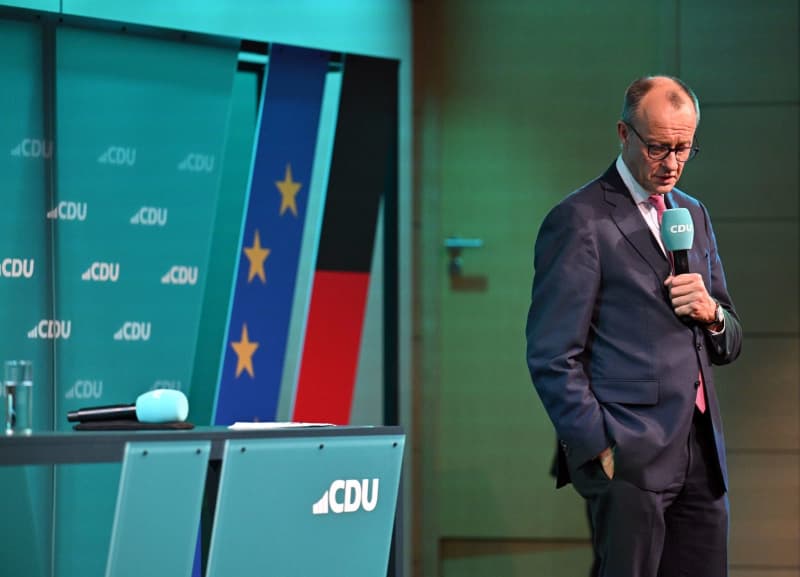Despite loud protests and criticism from its own ranks, the Christian Democratic Union (CDU) party wants to immediately implement party leader Friedrich Merz’s controversial five-point plan to stop illegal migration, should it take office after this month’s election.
That is according to a draft resolution for an “immediate action programme” to be adopted on Monday by the 1,001 delegates at an election party conference in Berlin. Dpa obtained a copy of the programme on Saturday.
German voters go to the polls on February 23.
The 15-point programme, entitled “Our immediate action programme for prosperity and security,” was sent to the party’s executive committee on Saturday evening.
It includes CDU chancellor candidate Merz’s controversial five-point plan to stop illegal immigration, which caused an outcry in Germany this week after a non-binding motion on the plan was passed in the lower house of parliament or Bundestag with the help of the far-right Alternative for Germany (AfD) for the first time in the party’s history.
Despite the uproar, Merz decided to force a vote on a bill to restrict migration on Friday, which was rejected by lawmakers.
Nine of the 15 individual points focus on economic issues and call for reversing several decisions made in the previous government coalition of the Social Democrats (SPD), the Greens and the pro-business Free Democrats (FDP).
The electricity tax and grid fees are to be reduced, resulting in a relief of at least 5 cents per kilowatt hour. To reduce bureaucracy, the CDU wants fewer company representatives, an abolition of the German supply chain regulation and the financial burdens of the Energy Efficiency Act. The former government’s heating law is to be abolished and the agricultural diesel reimbursement is to be fully reintroduced.
More flexibility sought, party says
Instead of a daily maximum working time, a weekly maximum working time is to be set, thus enabling more flexible scheduling. Overtime bonuses are to be made tax-free. Those who voluntarily want to work more in retirement should receive their salary tax-free up to €2,000 per month ($2,072). The CDU wants to reduce the sales tax on food in restaurants and pubs to 7%. In addition, the number of government commissioners is to be halved.
Security for the people of Germany
In addition to Merz’s five-point plan of permanent border checks, border rejections of people trying to enter illegally and an indefinite arrest for offenders and persons posing a danger who are obliged to leave the country, the CDU wants to pursue the Influx Limitation Act, which the Bundestag rejected on Friday. The clear legal objective is to limit migration, as well as to end family reunification for those with limited protection status and to give the federal police more powers.
According to its emergency programme, the CDU also wants to reverse the fast-track naturalization process of the former government.
“The German passport comes at the end of the integration process, not at the beginning,” the programme states. It also wants to repeal the newly implemented cannabis law. Child sexual abuse is to be combated by storing IP addresses. The party wants to stop violent offenders against women by using electronic ankle monitors.
Who will work with the CDU to implement its programme?
It remains to be seen whether the CDU will be able to implement its proposals if it wins the election – and if so, to what extent. According to the latest polls, the CDU would likely have to rely on at least the SPD or the Greens to form a government – and the SPD and Greens passed many of the laws that the CDU now wants to repeal.
Outrage over decision on 5-point plan with AfD votes
The SPD, Greens and many in the public were outraged that Merz accepted support from the AfD – after he had repeatedly said that he would stick to the “firewall” against working with the far-right party. Merz defended his move saying a right decision does not become wrong just because the wrong people agree with it.
Tens of thousands of people have taken to the streets in protest, and sharp criticism came from the two major churches and from former CDU chancellor Angela Merkel. The journalist and presenter Michel Friedman, a long-time CDU member, announced his resignation from the party.
The SPD, Greens and The Left party, a hard-left group, are talking about a breach of taboo and a lost of trust.
It will be interesting to see how the 1,001 delegates react to Merz’s position on the AfD – the CDU leader has strictly ruled out any cooperation with the right-wing populists.
Ahead of the party conference on Monday, Merz wants to inspect the party conference hall on Sunday. In the late afternoon, the presidium will meet first, followed by the executive board for the last consultations before the meeting of the delegates.
